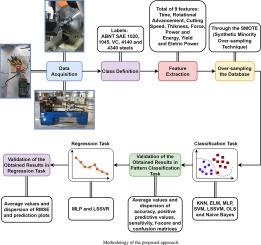A new proposal for energy efficiency in industrial manufacturing systems based on machine learning techniques
IF 12.2
1区 工程技术
Q1 ENGINEERING, INDUSTRIAL
引用次数: 0
Abstract
This research presents a novel methodology for enhancing energy efficiency in industrial manufacturing systems through machine learning techniques. Specifically, the study focuses on the automatic classification of five steel types — ABNT SAE 1020, 1045, 4140, 4340, and VC — based on electrical and mechanical characteristics observed during turning operations. The methodology includes the prediction of energy consumption for these steel types, applying regression models, under various machining conditions, including different rotation speeds and feed rates. To the best of the authors’ knowledge, this study is the first to address this issue using this specific approach. The proposed method was validated through computational experiments using multiple machine learning algorithms, with the Multilayer Perceptron (MLP) neural network achieving the highest classification accuracy of 95.52%. In terms of energy consumption prediction, MLP models demonstrated superior performance in 13 out of 15 turning scenarios. The regression analysis further confirmed the effectiveness of these models, achieving low Root Mean Squared Error (RMSE) values across different configurations. The results indicate that integrating machine learning into machining processes can significantly improve energy efficiency, leading to more sustainable industrial practices.

基于机器学习技术的工业制造系统能效新提案
本研究提出了一种通过机器学习技术提高工业制造系统能效的新方法。具体来说,研究重点是根据车削操作过程中观察到的电气和机械特性,对 ABNT SAE 1020、1045、4140、4340 和 VC 五种钢材类型进行自动分类。该方法包括在各种加工条件(包括不同的转速和进给率)下,应用回归模型对这些钢种的能耗进行预测。据作者所知,这项研究是首次使用这种特定方法来解决这一问题。通过使用多种机器学习算法进行计算实验,验证了所提出的方法,其中多层感知器(MLP)神经网络的分类准确率最高,达到 95.52%。在能耗预测方面,MLP 模型在 15 个转弯场景中的 13 个场景中表现优异。回归分析进一步证实了这些模型的有效性,不同配置下的均方根误差(RMSE)值都很低。结果表明,将机器学习集成到加工过程中可以显著提高能效,从而实现更可持续的工业实践。
本文章由计算机程序翻译,如有差异,请以英文原文为准。
求助全文
约1分钟内获得全文
求助全文
来源期刊

Journal of Manufacturing Systems
工程技术-工程:工业
CiteScore
23.30
自引率
13.20%
发文量
216
审稿时长
25 days
期刊介绍:
The Journal of Manufacturing Systems is dedicated to showcasing cutting-edge fundamental and applied research in manufacturing at the systems level. Encompassing products, equipment, people, information, control, and support functions, manufacturing systems play a pivotal role in the economical and competitive development, production, delivery, and total lifecycle of products, meeting market and societal needs.
With a commitment to publishing archival scholarly literature, the journal strives to advance the state of the art in manufacturing systems and foster innovation in crafting efficient, robust, and sustainable manufacturing systems. The focus extends from equipment-level considerations to the broader scope of the extended enterprise. The Journal welcomes research addressing challenges across various scales, including nano, micro, and macro-scale manufacturing, and spanning diverse sectors such as aerospace, automotive, energy, and medical device manufacturing.
 求助内容:
求助内容: 应助结果提醒方式:
应助结果提醒方式:


